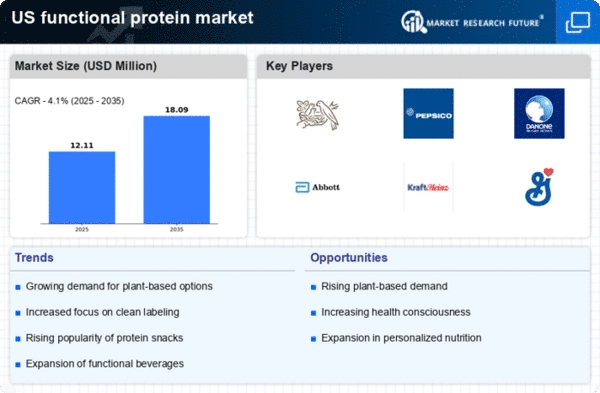Increasing Health Consciousness
The growing awareness of health and wellness among consumers is a primary driver of the functional protein market. Individuals are increasingly seeking dietary options that support their health goals, such as weight management and muscle recovery. This trend is reflected in the rising demand for protein-rich foods and supplements, with the functional protein market projected to reach approximately $20 billion by 2026. Consumers are gravitating towards products that offer functional benefits, such as enhanced energy and improved digestion. As a result, manufacturers are innovating to create products that cater to these health-conscious consumers, thereby expanding the functional protein market. This shift in consumer behavior indicates a long-term trend towards prioritizing health, which is likely to sustain growth in the functional protein market.
Expansion of E-commerce Platforms
The proliferation of e-commerce platforms is reshaping the distribution landscape of the functional protein market. Consumers are increasingly turning to online shopping for convenience and access to a wider range of products. In 2025, online sales of functional protein products are projected to grow by 15%, indicating a shift in purchasing behavior. This trend is encouraging manufacturers to enhance their online presence and invest in digital marketing strategies. The ability to reach a broader audience through e-commerce is likely to facilitate market growth, as consumers seek out specific functional protein products that meet their dietary needs. The convenience of online shopping, coupled with the growing trend of health and wellness, is expected to significantly impact the functional protein market.
Innovations in Product Formulation
Innovations in product formulation are driving advancements in the functional protein market. Manufacturers are increasingly focusing on developing new protein sources and blends that cater to diverse dietary preferences, including vegan and gluten-free options. The introduction of novel ingredients, such as pea protein and hemp protein, is expanding the range of functional protein products available to consumers. This trend is likely to attract a broader consumer base, as individuals seek alternatives to traditional protein sources. In 2025, the market for plant-based protein is expected to grow by 20%, reflecting the demand for innovative formulations. The emphasis on product innovation is crucial for maintaining competitiveness in the functional protein market.
Rising Demand for Sports Nutrition
The increasing participation in fitness and sports activities is significantly influencing the functional protein market. Athletes and fitness enthusiasts are actively seeking protein supplements to enhance performance and recovery. The sports nutrition segment is expected to account for a substantial share of the functional protein market, driven by the need for high-quality protein sources. In 2025, the sports nutrition sector is anticipated to grow by over 10%, reflecting the rising awareness of the importance of protein in athletic performance. This trend is prompting manufacturers to develop specialized protein products tailored for athletes, further propelling the functional protein market. The focus on performance enhancement and recovery is likely to continue driving demand in this segment.
Growing Interest in Sustainable Sourcing
The rising concern for environmental sustainability is influencing consumer choices in the functional protein market. Many consumers are now prioritizing products that are sourced sustainably and produced with minimal environmental impact. This trend is prompting manufacturers to adopt sustainable practices in sourcing protein ingredients, such as using plant-based proteins that require fewer resources compared to animal-based sources. In 2025, it is estimated that 30% of consumers will actively seek out sustainably sourced protein products. This shift towards sustainability is likely to drive innovation and transparency in the functional protein market, as brands strive to meet the expectations of environmentally conscious consumers.

















